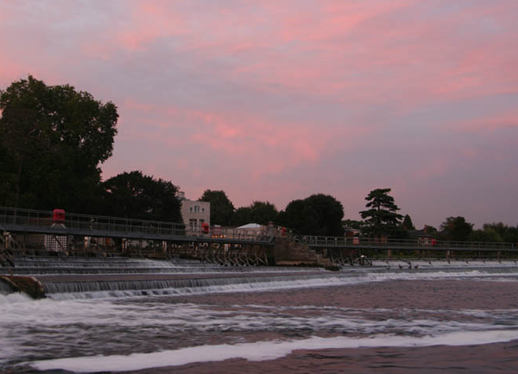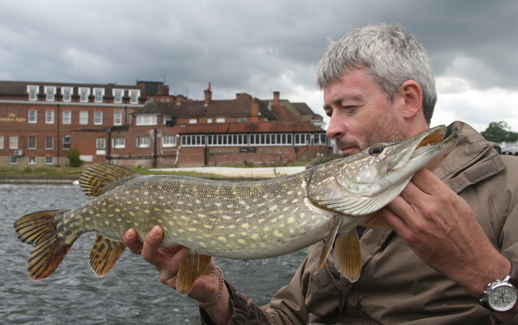
by Jon Berry.
Autumn, in a conventional year, arrives softly. There are no dramatic moments, no definitive climatic changes, just an increasing awareness that the days are growing shorter, the mornings cooler, the canopy overhead more browns than greens. It is a subtle shift in time and atmosphere – as imperceptible as the bite of a crucian carp, or the moment when flask coffee turns to frigid bile.
I spend most summers looking forward to the autumn months, knowing that the basking, listless fish of August become attainable when the rivers and ponds carry the cool coloured run-off of new rain. I fish throughout the warmest months of course – what else would I do? – but dog days are rarely fish days and I am invariably relieved when temperatures begin to fall.
The drop in temperature came early, though. July, in fact. It was the week before the life-affirming carnage that is Port Eliot, and I was in a punt with Ian and Roger the Boatman. We were at Marlow Weir on the River Thames and, adopting the perfectly sensible anglers’ calendar immortalised by Mr. Crabtree, should have been fishing for barbel, chub and dace. Indeed, if real life resembled the cartoon adventures of the pipe-smoking old man and his protégé Peter, we should have been enjoying great sport with lashings of fish and a baking sun for company. But it was not so.

The day began with rain and cold winds, and both attacked us sideways. And if there is one place where it is impossible to ignore the harsher elements, it is in a punt which is anchored in the middle of a weir pool’s froth. By lunchtime Ian and I had instructed Roger to moor up under the lasher where the predators would be hiding. The summer species were not feeding or, if they were, they were doing so somewhere else. It was cool, north-easterly and autumnal and, metaphorically, we knew we were telling Crabtree to stick his calendar in his pipe and smoke it. Predator fishing in July – the actions of desperate, unscrupulous men.
Ian landed a wonderfully plump perch during the afternoon, but it was not until the last moments of the day that I hooked something that wasn’t a bleak. A modest pike seized my plug – from boredom, perhaps – and wallowed in to the net. Now a Thames pike is a fine creature, a totem fish ingrained in the river’s history and immortalised in the words of Chalmers, Jerome and others, but it is not a summer fish. Not at all. Thames pike belong to frosted mornings and empty tow-paths, to grim early starts when the lock-keepers are still asleep. A July pike is more than incongruous – it is heretic. As I slipped the fish back, embarrassed to have disturbed it in such an untimely manner, it turned back to the boat and bit me.
It was tea-time in July but the sky was grey-black, portentous in an unsentimental, Old Testament way. Now I’m not one to look for signs or meaning in the unfathomable caprice that is nature, but as darkness swept in and the blood began to dry on my fingers, I knew that the river was giving me a mild but unequivocal bollocking.
Weeks later, my brother and I went in search of tench, a proper warm-water species. We both knew that the erratic summer would eventually disappear – and when it did, so would the fish. An August visit to the farm pond would be our last chance to watch a float vanish by the lilies and be replaced by boiling vortices of olive. One perfect summer morning was all we asked for – and we got it.

We were there before dawn and got the pitch we wanted – a promontory with a deep, lilied margin on the east bank – and as first light reached the water our floats settled in the baited swim. Chris and I had both set up our floats ‘lift method’ style, instinctively and without discussion, knowing that a proper tench morning would be sullied by anything else.
For those not versed in the dark art of tenching, the lift method was devised after the Second World War, and was later popularised by Dick Walker and the Taylor brothers. A large shot is pinched close to the hook, resting on the bottom, precisely set so that it is displaced as soon as a tench takes the bait. This has the effect of pushing the float back up through the surface film until it lies flat – an event so dramatic as to be unmissable – after which the fleeing tench drags the float under in the conventional manner and the angler, if he has not done so already, strikes home the hook. It is a method of wonderful simplicity and ruthless cunning, the sort of thing that would have had Crabtree chuckling away for hours in his tackle shed.
The tench did not arrive in our swim as quickly as we would have wished and the tell-tale bubbles, if they ever did materialise, were hidden by ripples – but the ground bait mixture of mashed bread, sweetcorn and molasses was too tempting for the fish and by mid-morning we were successful. Chris caught first and won the bragging rights, but the last of the day was the biggest and fell to my rod. It weighed just over five pounds; not a giant, but a perfectly fine tench with which to mark the last days of summer. As I slipped it back in to cool marginal water, I knew autumn and winter would pass before I saw the farm pond again.
I got married the following day and disappeared to Italy with my new wife. Among the splendours of Florence and Rome I forgot all about tench. Chris, having completed the Best Man’s duties, went to the Himalayas and summited somewhere in the clouds. He tells me that he forgot all about tench too, for a while at least. But those adventures are over and now we are back, and the path to my door is suddenly covered with leaves. Autumn has arrived – unannounced and beautiful, as always. The river, so low and languid all summer, is finding its colour and coming alive, and roach, perch and grayling all beckon – just as Mr. Crabtree said they would.